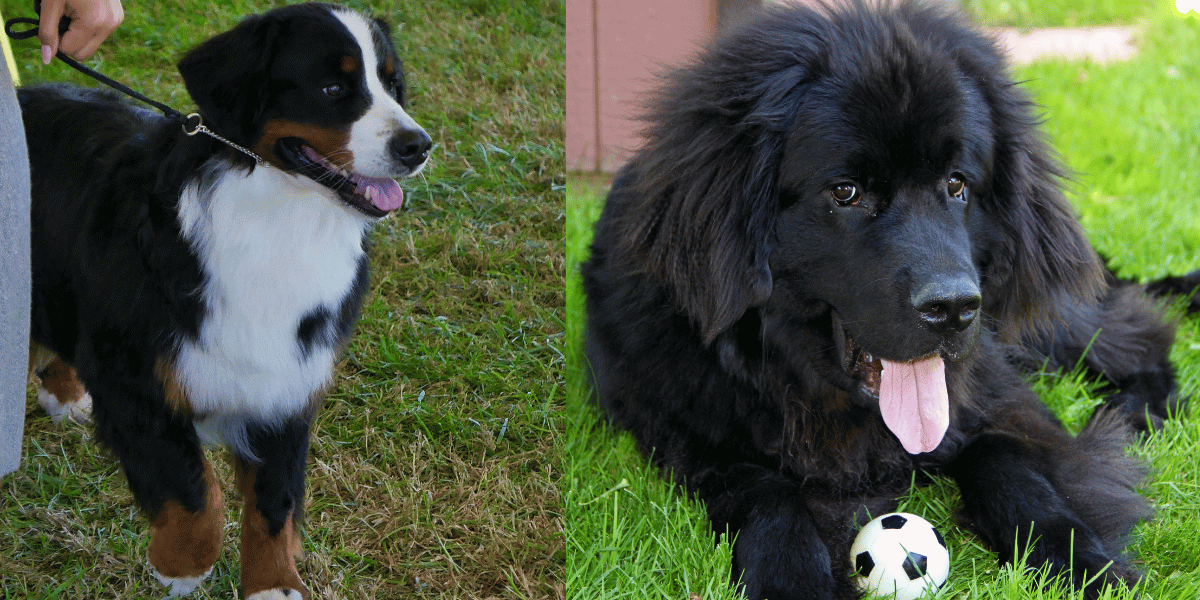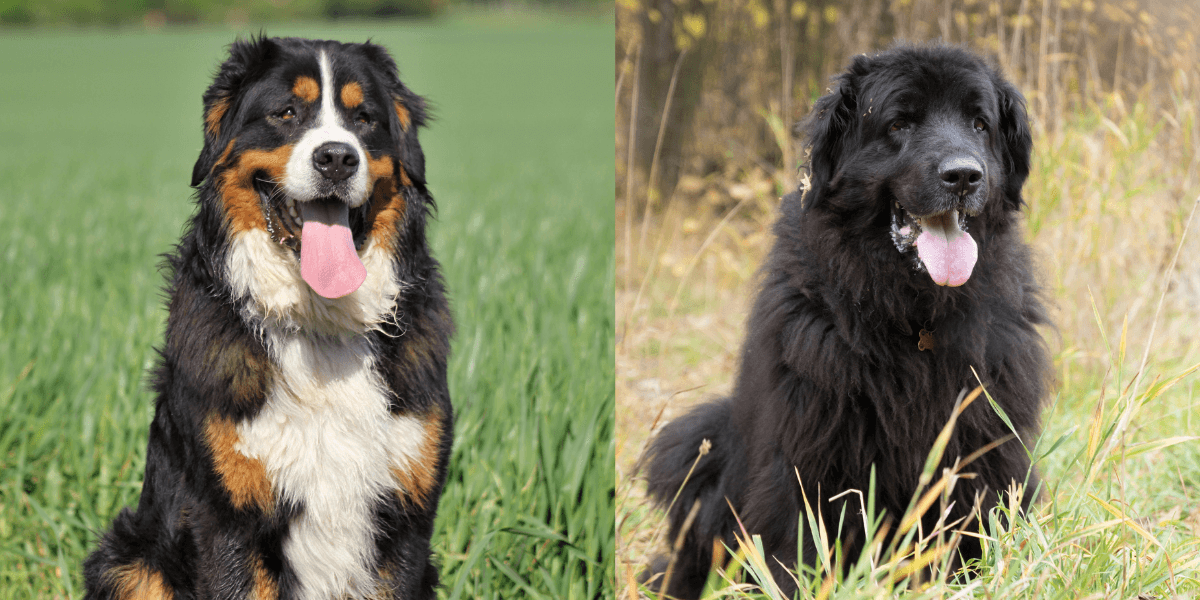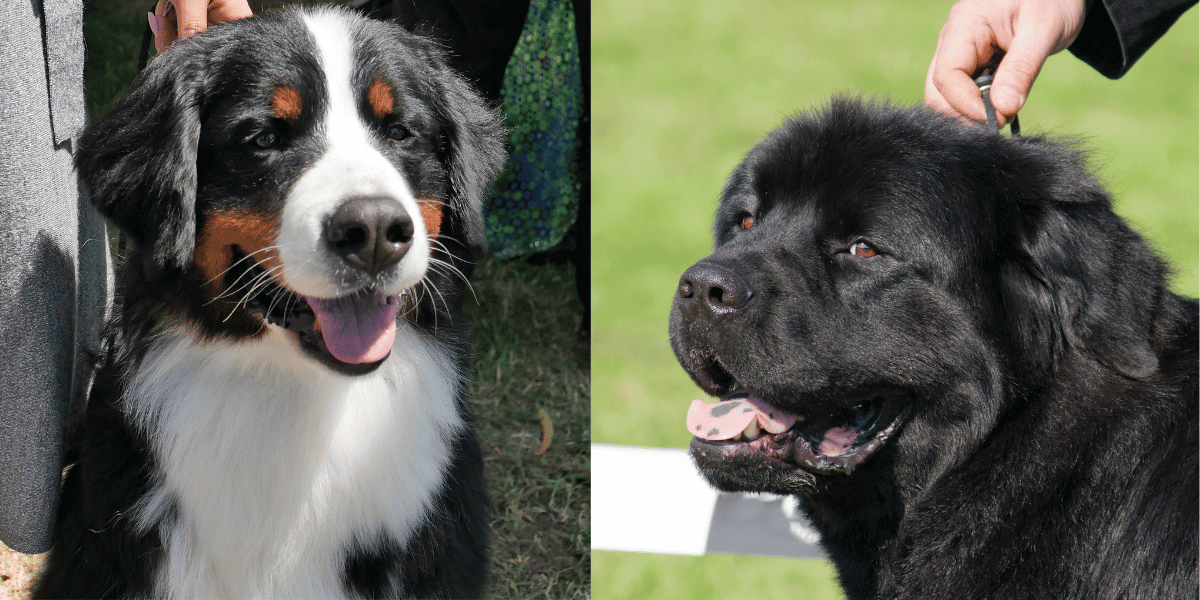Introduction
Bernese Mountain Dog vs Newfoundland can be a challenging choice
- Both breeds are known for their gentle nature and impressive size
- If you're pondering the Bernese Mountain Dog vs Newfoundland debate, you’re not alone
- This guide will help you understand the nuances between these two majestic breeds
1. Temperament and Personality

In the Bernese Mountain Dog vs Newfoundland decision, temperament plays a crucial role.
Bernese Mountain Dog:
- Behavior: Great with children and other pets, making them a family favorite
- Affection: Extremely loyal and loving towards their family members
- Social Skills: Generally reserved with strangers but warms up with time
- Grooming Needs: Requires regular brushing to manage their long, wavy coat
Newfoundland:
- Behavior Patient and gentle, especially with kids, earning the "nanny dog" title
- Affection: Known for their boundless affection and ability to bond closely with their owners
- Social Skills: Outgoing and friendly, they easily make new friends, including strangers
- Grooming Needs: Requires regular grooming to manage their thick, water-resistant coat
2. Size and Appearance

Size and appearance are key factors when choosing between these two breeds.
Bernese Mountain Dog:
- Size: Males typically weigh between 80-115 pounds, while females are 70-95 pounds
- Coat: Known for their striking tricolor coat (black, white, and rust)
- Build: Sturdy and robust, with a strong, muscular frame
- Ears: Medium-sized and triangular, set high on the head
- Shedding: Sheds moderately
Newfoundland:
- Size: Males can weigh between 130-150 pounds, and females 100-120 pounds
- Coat: Thick and water-resistant, colors like black, brown, gray, and Landseer
- Build: Large and powerful with a broad chest and strong legs
- Ears: Medium-sized and hang down, blending well with their thick coat
- Shedding: Sheds heavily
3. Exercise and Activity Levels

Both breeds enjoy physical activity but have different needs and preferences.
Bernese Mountain Dog:
- Exercise Requirements: Moderate exercise needs, including daily walks and playtime
- Activity Level: Enjoys interactive play and outdoor activities
- Energy Levels: Generally has moderate energy; requires exercise to avoid boredom
- Best Activities: Hiking, gentle play sessions, and family outings
- Outdoor Time: Prefers cooler climates due to their thick coat, which can overheat in hot weather
Newfoundland:
- Exercise Requirements: Moderate to high exercise needs, including swimming and long walks
- Activity Level: Highly enjoys water-based activities and is quite active
- Energy Levels: Generally has high energy, especially when younger, but tends to calm down
- Best Activities: Swimming, hiking, and large yard play
- Outdoor Time: Prefers cooler climates and can be prone to overheating in hot weather
4. Grooming and Maintenance

Grooming is vital for both breeds, each needing regular but different attention.
Bernese Mountain Dog:
-
Brushing: Regular brushing is needed to control shedding and prevent matting.
- Bathing: Needs occasional baths to keep their coat clean and healthy
- Nail Trimming: Regular nail trimming is essential to prevent overgrowth and discomfort
- Ear Care: Check and clean ears regularly to prevent infections
- Dental Care: Routine dental care is important for overall health
Newfoundland:
- Brushing: Requires frequent brushing (2-3 times a week) to manage their thick coat
- Bathing: Needs occasional baths, particularly if they swim often, to keep their coat in good condition
- Nail Trimming: Regular nail trimming is necessary to keep their large paws healthy
- Ear Care: Regular ear checks and cleaning are important to prevent infections due to their floppy ears
- Dental Care: Consistent dental care is essential for preventing dental issues
Check out our German Shepherd Dog Grooming 101 for more coat care tips while learning about Bernese grooming.
5. Health Considerations

Both Bernese Mountain Dogs and Newfoundlands have certain health issues.
Bernese Mountain Dog:
- Common Issues: Prone to cancer, hip and elbow dysplasia, and bloat
- Lifespan: Generally lives 7-10 years
- Exercise: Regular, moderate exercise can help manage weight and support joint health
- Diet: Feed a high-quality diet suited to their size and age
- Preventive Care: Regular vaccinations and health screenings are important
Newfoundland:
- Common Issues: Prone to hip and elbow dysplasia, heart problems, and bloat
- Lifespan: Typically lives 8-10 years
- Exercise: Ensure regular exercise to maintain a healthy weight and support overall health
- Diet: Provide a balanced diet to support their large size and energy needs
- Preventive Care: Routine vaccinations and health checks are essential
Learn more about Bernese and Newfoundland health in this detailed comparison.
6. Living Environment and Space

Consider your living environment; space needs affect these breeds' happiness and health.
Bernese Mountain Dog:
- Space Needs: Adaptable to various situations but benefits from space to move around
- Indoor Living: Can live comfortably indoors with regular exercise and outdoor access
- Outdoor Space: A yard is beneficial but not mandatory; daily walks are essential
- Climate Preferences: Prefers cooler climates due to their thick coat
- Family Life: Adjusts well to family life and is content with moderate space
Newfoundland:
- Space Needs: Requires more space due to their large size and energy levels
- Indoor Living: Can live indoors but needs ample room to move comfortably
- Outdoor Space: Thrives with access to a large yard or outdoor area for play
- Climate Preferences: Prefers cooler climates; can struggle in hot weather
- Family Life: Best suited for homes with sufficient space and access to outdoor activities
7. Cost and Maintenance

Understanding the costs and maintenance involved can help you make a good decision.
Bernese Mountain Dog:
- Initial Cost: Typically ranges from $1,000 to $2,500
- Grooming Costs: Regular grooming can cost $50-$100 per session
- Health Care Costs: Regular vet visits, screenings, and potential treatments
- Food Costs: High-quality food costs about $50-$80 per month
- Training: Professional training classes may cost $100-$300
Newfoundland:
- Initial Cost: Generally between $1,200 and $3,000
- Grooming Costs: Frequent grooming can cost $60-$120 per session
- Health Care Costs: Regular vet visits, screenings, and potential treatments
- Food Costs: High-quality food costs about $60-$100 per month
- Training: Professional training classes may range from $150-$350
Check out The Best Orthopedic Beds for Great Danes—great for Bernese Mountain Dogs too!
FAQs
1. Are Bernese Mountain Dogs good with kids?
- Yes, they are gentle and great with children
2. Do Newfoundlands require a lot of exercise?
- Yes, they enjoy regular exercise and activities, especially swimming
3. How often should I groom a Bernese Mountain Dog?
- They should be groomed 2-3 times a week
4. Bernese Mountain Dog vs Newfoundland: Key differences?
- Bernese are smaller and more reserved, while Newfoundlands are larger and more friendly
5. Do both breeds have similar health issues?
- Yes, both breeds often face conditions like hip dysplasia and bloat.
6. Can Bernese Mountain Dogs adapt to apartment living?
- They can, provided they get enough exercise
7. Are Newfoundlands good with other pets?
- Yes, they are generally friendly with other animals
Conclusion
- Bernese Mountain Dogs and Newfoundlands are great family pets with unique traits
- Both breeds like German Shepherds, are gentle and loyal family pets.
- Consider space and resources to meet their needs
- Evaluate factors like size, grooming, and health to choose the best fit
- If you found this guide helpful, share it with friends and family
References
- Bernese Mountain Dog vs Newfoundland
- German Shepherd Dog Breed
- Dog Hip and Joint Pain: A Comprehensive Guide
- The Complete Guide to Dog Grooming: With Vet-Approved Tips




